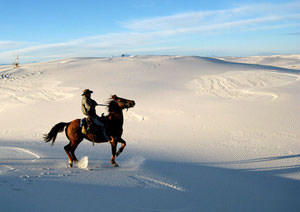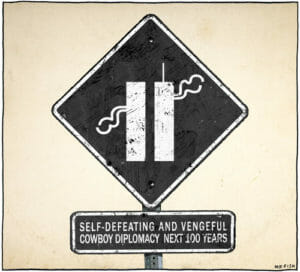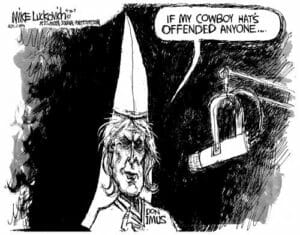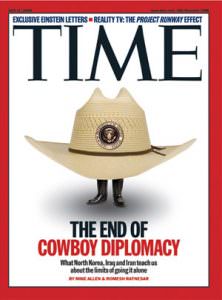Until We Meet Again: Giving Thanks to the American Cowboy
Once upon a time, a cowboy saved my life I think of him in certain moments, at the sight of red rocks, for instance, or the hint of a desert storm Now, the time has come to tell his story I think of him in certain moments, at the sight of red rocks, for instance.
Letter From the West is a monthly series by Deanne Stillman that explores what is going on in our wide open spaces and what we do to one another and all that lives there.
Once upon a time, a cowboy saved my life. I think of him in certain moments, at the sight of red rocks, for instance, or the hint of a desert storm. Now, the time has come to tell his story. He wasn’t named Ike, Rowdy or Dad, but he was named Tex, and I met him shortly after I had a first encounter with another Western icon — a giant tumbleweed blowing across the highway in New Mexico. Tex was living in the Grand Canyon. Along with a friend named Peter, I had thumbed a ride to the canyon from Albuquerque, and somewhere along the trail to our reserved campsite, Tex joined our hike. He was big and beefy, over 6 feet tall, or at least that’s how I remember him. He knew a lot about the outdoors. And he told great stories — like the one about being wanted for unpaid alimony, which was why he was hiding out in a national park. Once, he had made a living wrestling Brahma bulls in rodeos, but with the law after him, well, a guy just had to get out of Dodge.
Down at the bottom of the canyon, Peter and I decided to camp in a no-camping area — more remote and no people — so we wandered off the trail and found a spot, in a grove of cottonwoods, somewhere along a bank of the Colorado River. We said adios to Tex, who told us he’d be camping nearby, and set up our tent. Two nights later, we sat on a riverbank and gazed at the stars. The canyon was all lit up and the sky was a ceiling of glitter. But then came the galloping of hooves, and voices shouting — “Hey, where’s the dancing girls? There she is!” — and three men on mules blocked our escape as one closed in, twirling a lasso and then dropping it around my shoulders. I screamed and tried to break free of the rope. Suddenly Tex appeared, leaping out of the brush, grabbing the bridle of the mule that carried my attacker, and flipping man and animal to the ground. I broke away and Peter followed. We raced across starlit paths, finally spotting a trail, and then ran back toward where we came in, hoping for a lifeline.
We soon found a ranger station, and there I blurted out a strange tale — “Drunk men on mules tried to lasso me! They’re beating up our friend!” After convincing the ranger that we weren’t lying, we saddled up three horses at the station, and headed back to our campsite, somewhat difficult to find as Peter and I didn’t really know where we were camping. But when we heard the sound of men laughing and saw smoke from a campfire, we figured we were in range. Once there, we found a curious sight: They were all sitting around the fire, sharing a bottle of Wild Turkey. “Hey, guess what?” Tex said. “We’re all from the same town in Texas!” A few days later, I learned that the three men were guides who led the tourist mule packs up and down the park trails. I filed a complaint against them, and the last I heard, over 20 years ago, it was being processed.
As for Tex, he came to visit me in Albuquerque a few times, and he told me about his life. He couldn’t make enough money on the rodeo circuit, he said, to keep his wife happy. He liked living in national parks, especially the Grand Canyon, because you could stay down there for a long time and the world would leave you alone. But one thing was really bothering him — more than anybody or anything, he missed his horse. He had lost him in his divorce, he said, and there’d never be another one like him. There’s nothing as heartbreaking as seeing a tough guy on the verge of tears, a wet veil crossing his eyes like a desert cloud, his body twitching with a distant rumble. The storm passed quickly and then one day, he left, just like Shane in the movie — except he was on foot and embarrassed to say goodbye.
Over the years, I’ve met variations of the man called Tex. Some are working on ranches and others are between jobs; they crisscross the West in their old pickups, carrying their gear — their saddles, their veterinary potions, a weapon or two — and to a man, they wonder where all of it has gone, where are the animal nations, the rock tribes, brother eagle and sister bear, even though they know the answer, and know in their hearts that they — and we — have all been a party to the vanishing of what once was here, and had been here in the timeless time when the ancient ones lived in canyons.
Sometimes I wonder what happened to Tex. Is he breathing his last breath under a cottonwood grove as the Colorado whispers and rages on by? Are his boots on or are they stashed away in some Flagstaff pawnshop? Or is he dancing with some senorita in a roadside mirage? Chances are, he never made it to the Rodeo Hall of Fame, and, most likely, he wasn’t featured in the Ken Burns documentary on national parks.
But Tex, if you happen to be sitting in an Internet cafe and find yourself reading this column, I’d like to say that I hope you got your horse back. And thanks for the assist, cowboy.
Deanne Stillman’s latest book is the widely acclaimed “Mustang: The Saga of the Wild Horse in the American West,” a Los Angeles Times “Best Book ’08” and winner of the California Book Award silver medal for nonfiction. Her book includes an account of the 1998 Christmas horse massacre outside Reno, Nev., as well as the story of Bugz, the lone survivor of the incident. Her previous book was “Twentynine Palms: A True Story of Murder, Marines, and the Mojave,” the cult classic which Hunter Thompson called “A strange and brilliant story by an important American writer. It’s now out in a new, updated edition. Her work appears in the Los Angeles Times, Slate, Orion, National Review Online and other publications and is widely anthologized. Her plays, including “Star Maps,” have won prizes in theater festivals around the country. She is currently writing “Mojave Manhunt” for Nation Books, based on her Rolling Stone piece of the same name. Follow Deanne Stillman on Facebook.
Your support matters…Independent journalism is under threat and overshadowed by heavily funded mainstream media.
You can help level the playing field. Become a member.
Your tax-deductible contribution keeps us digging beneath the headlines to give you thought-provoking, investigative reporting and analysis that unearths what's really happening- without compromise.
Give today to support our courageous, independent journalists.





You need to be a supporter to comment.
There are currently no responses to this article.
Be the first to respond.